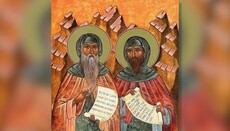A dialogue with St. John Climacus: How to overcome despondency and sloth

Left alone with the great hermit and abbot of Sinai, we converse about the pernicious passions that destroy the soul.
It might seem that we already know everything about the passions. Priests speak of them from the ambo. With repentance for sins, the believer comes to confession, desiring spiritual cleansing. Finally, each evening, in the prayers before sleep, we recite the “Daily Confession of Sins” from the Prayer Book, reviewing the long list of transgressions and noting those that we have indeed committed.
And yet, the passions continue to nest within us, devouring the soul like locusts. All too often we grow so accustomed to them that we no longer even notice them in ourselves.
Deliverance from the passions is impossible until they are exposed.
To aid us in this work comes the Egyptian ascetic. Rereading The Ladder of St. John, we enter into a soul-saving dialogue with him, one that, I am certain, can serve as real help for the healing of inner wounds.
On depression and despondency
The modern man of the 21st century knows well what depression is. Bloggers write about it online. Psychotherapists strive to treat it. The inhabitants of great cities are especially troubled by this affliction, for the daily turmoil of urban life steadily drains their inner strength.
Sometimes, by casually saying “I have depression,” we seek to excuse our laziness and indifference to reality. Yet often depression is a truly serious illness, a symptom of mental disorders or even grave physical diseases such as cancer. Therefore, we should not condemn everyone who suffers from depression, for many bear it as part of their life’s cross.
Setting aside clinical depression, let us speak of a disorder of the soul that outwardly resembles it: the passion of despondency.
Despondency often arises from weakness of faith.
When a person loses hope in God and relies only on his own strength, sooner or later he discovers that those strengths are insufficient to overcome life’s trials. Then, by the instigation of the tempter, despondency draws near.
Gripped by this heaviness, the sufferer lets his hands fall, ceases spiritual labor, and begins to drift passively along the current of life. Mile by mile, he approaches a waterfall that will hurl him into the abyss of despair. Only the Lord can save a man from despondency. But for this, we must exert effort to reach the shore amid the raging torrent of passions.
Our reflections are confirmed by the abbot of Sinai, who expressed his understanding of despondency:
“Despondency is the exhaustion of the soul, the slackening of the mind. It slanders God, as though He were not merciful or loving of mankind.” – St. John Climacus
Despondency – the enemy of prayer; repentance and labor – the enemies of despondency
Even in our modest spiritual experience, we see how despondency destroys the soul. A despondent person is not inclined to prayer. He may spend hours scrolling through social media feeds, reels, and stories, yet he will not compel himself to pray, to read the Holy Scriptures, or to do works of mercy. That despondency is the chief foe of prayer is also affirmed by the abbot of Sinai:
“When we rise for prayer, it reminds us of necessary tasks and employs every device to distract us from prayer under some plausible pretext.” – St. John Climacus
Indeed, to a despondent “prayer-reader,” the familiar texts of the Prayer Book quickly grow dull. To speak to God in his own words he either cannot or will not, lacking sincere faith.
How, then, can we battle despondency? How can we cast it off swiftly, lest it paralyze us spiritually?
“He who weeps for himself does not know despondency. Let this tormentor be bound by remembrance of our falls! Let us strike it with the blows of handiwork and the contemplation of future blessings.” – St. John Climacus
If despondency is the enemy of prayer, then repentance and labor are its enemies. True repentance is not only weeping for sins, but also complete trust in the Lord and His saving grace. In speaking with God, we cease to feel alone, cutting off one of the roots of despondency. Physical labor too helps direct inner energies to a healthy course. Not without reason is it said: “Without labor, you will not catch even a fish from the pond.”
Sloth – the offspring of despondency
We are well acquainted with the “domino principle.” However intricate the structure built of domino tiles, a single careless touch will bring them all down in an instant. Spiritual life functions much the same way.
Once we fall in one sin, the next follows swiftly.
The holy fathers set before us the whole tree of passions, where each sin springs from the one before it. Thus, the passion of despondency inevitably gives birth to a “grateful daughter” – sloth. Why “grateful”? Because having been born, sloth feeds on the “mother’s milk” of despondency. Then, having grown strong, it joins its “mother” in destroying the soul that had once cradled it.
The despondent person is always slothful. He compels himself to no good deed, grows indifferent to the sufferings of others, and constantly pities himself, feeding his egoism. Yet if he comes to his senses, rises up, and turns to God for help – the Lord will not delay in freeing him from these afflictions. For He does not will the death of the sinner, but desires that he “turn and live.”
Only a courageous soul can withstand sloth and despondency
St. John Climacus likewise views despondency and sloth as bound together. He says:
“The courageous soul revives a thought that has died, but despondency and sloth scatter all its treasures.” – St. John Climacus
How greatly do we now lack such courage of soul! Especially in times of trial, when the Church endures attacks and persecutions, and her faithful children are subjected to slander and violence. Despondency, sloth, and indifference become our inner enemies, no less dangerous than external foes.
We must remember: God loves all – but most of all He loves the brave. It is not necessary to prove to everyone that “truth must be with fists.” It is enough to remain faithful to Christ and to His Church, courageous in trials, unyielding in faith. Then a time of peace will come much sooner than we expect. I am convinced that for courageous souls, the Lord has prepared joy not only in Heaven but even here on earth.











